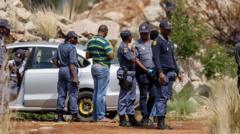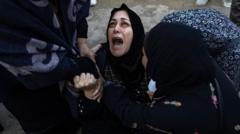In a bid to arrest approximately 4,000 illegal gold miners hiding underground, South Africa has cut off their supplies, prompting a humanitarian crisis as conditions worsen. The government is facing scrutiny over its decisions, balancing law enforcement with respect for human rights.
South Africa's Crackdown on Illegal Miners: A Humanitarian Crisis Unfolds

South Africa's Crackdown on Illegal Miners: A Humanitarian Crisis Unfolds
Government efforts to tackle illegal mining in South Africa raise humanitarian concerns amid increasing arrests and dire living conditions for miners underground.
South Africa's government has intensified its crackdown on illegal gold miners, who are presently hidden in a mine near Stilfontein, sparking significant humanitarian concern. With food and water supplies cut off, approximately 4,000 illegal miners—many of them undocumented immigrants from neighboring countries—are facing dire conditions underground. This crackdown has resulted in 1,000 arrests thus far as authorities adopt what they describe as a strategy to "smoke them out."
The miners, known locally as "zama zama," have resorted to illegal mining in response to unemployment and poverty exacerbated by numerous mine closures in recent years. Their activities, while illegal, contribute to subsistence for many families, creating a parallel economy that supplies food and essential goods to the underground community. Some local residents have even taken it upon themselves to communicate with the miners through notes and provided limited support via ropes.
Despite local pleas for humanitarian assistance, South African government officials, including the Minister in the Presidency Khumbudzo Ntshavheni, have expressed a firm stance against what they term "criminals." Officials emphasize that arresting illegal miners is a priority despite growing concerns regarding the treatment of those trapped underground. Critics argue that the government’s harsh measures may infringe on basic human rights, while others applaud the efforts to restore law and order.
In recent statements, the South African Human Rights Commission announced its intention to investigate the police's actions, particularly the deprivation of food and water. The balance between enforcing the rule of law and ensuring the safety and well-being of individuals caught in this crisis is drawing increasing scrutiny from both the public and humanitarian organizations.
As conditions become increasingly desperate underground, it remains to be seen how the South African government will navigate the complexities of law enforcement, human rights, and social justice in addressing illegal mining activities. Local leaders continue to voice their fears for the health and safety of those trapped underground, underscoring a multifaceted crisis that touches on legal, humanitarian, and socioeconomic issues.




















